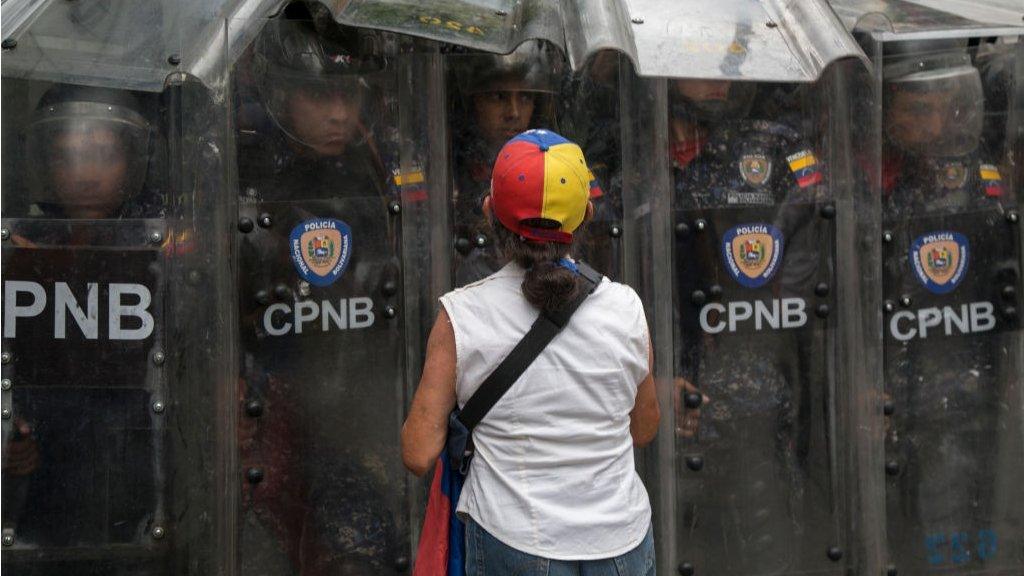Venezuela crisis: Russian military planes land near Caracas
- Published
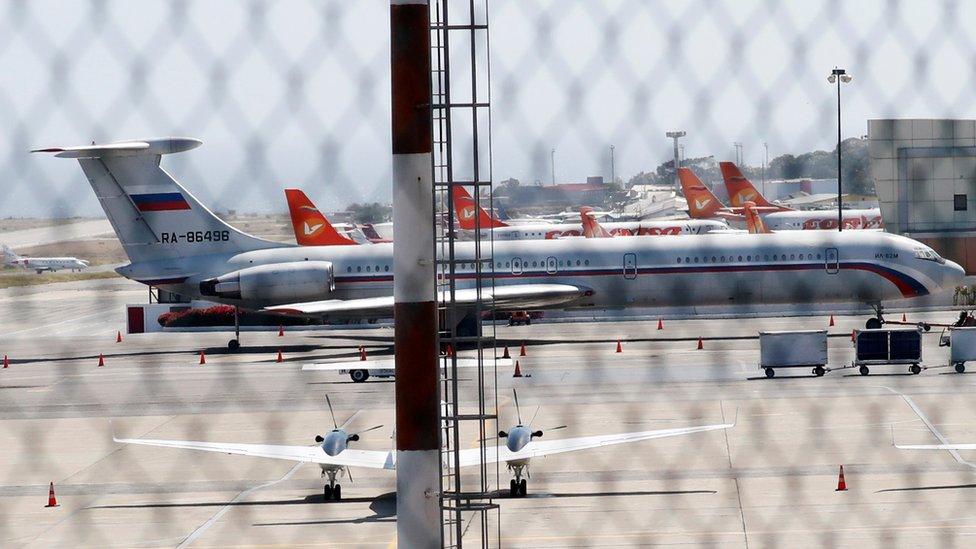
A Russian aircraft was pictured at an airport near Caracas on Sunday
Two Russian military planes landed in Venezuela's main airport on Saturday, reportedly carrying dozens of troops and large amounts of equipment.
The planes were sent to "fulfil technical military contracts", Russia's Sputnik news agency reported.
Javier Mayorca, a Venezuelan journalist, wrote on Twitter that he saw about 100 troops and 35 tonnes of equipment offloaded from the planes.
It comes three months after the two nations held joint military exercises.
Russia has long been an ally of Venezuela, lending the South American nation billions of dollars and backing its oil industry and military.
Russia has also vocally opposed moves from the US to impose sanctions on the government of Venezuelan president Nicolás Maduro.
On Monday, US Secretary of State Mike Pompeo spoke on the phone with his Russian counterpart, Sergei Lavrov, urging Moscow to "cease its unconstructive behaviour" in Venezuela.
"The secretary told Russian Foreign Minister Lavrov that the United States and regional countries will not stand idly by as Russia exacerbates tensions in Venezuela," the state department said.
What about the two Russian planes?
Mr Mayorca said on Twitter that a Russian air force Antonov-124 cargo plane and a smaller jet landed near Caracas on Saturday.
He said that Russian General Vasily Tonkoshkurov led the troops off one of the planes.
A military plane with a Russian flag on its fuselage could be seen on the tarmac at an airport on Sunday. Images on social media also appeared to show Russian troops gathered at the airport.
Allow X content?
This article contains content provided by X. We ask for your permission before anything is loaded, as they may be using cookies and other technologies. You may want to read X’s cookie policy, external and privacy policy, external before accepting. To view this content choose ‘accept and continue’.

Ties between Moscow and Venezuela have strengthened in recent months, amid worsening relations between the US and Venezuela. In December, Russia sent two air force jets there as part of a military exercise.
Russia has condemned other foreign powers for backing Venezuelan opposition leader Juan Guaidó, who declared himself interim president in January.
President Maduro has accused Mr Guaidó of trying to mount a coup against him with the help of "US imperialists".
The Kremlin echoed that line, accusing Mr Guaidó of an "illegal attempt to seize power" backed by the United States and pledging to do "everything required" to support Mr Maduro.


A message to Washington
Russia is intent on demonstrating the limits of US policy towards Venezuela.
The Trump administration is pushing for regime change and the re-establishment of democracy.
But Moscow - a long-standing ally of the Venezuelan authorities - has provided the embattled Maduro regime with diplomatic, economic and military support.
Last December two Russian Tu-160 long-range bombers touched down in Caracas prompting a war of words between Washington and Moscow. There have been joint military exercises too.
While it is not clear what equipment these latest military flights may have been carrying, they send an additional message to Washington.
Mr Trump has refused to rule out military action against the Maduro government.
The Russian President Vladimir Putin is putting down another marker, emphasising that Venezuela is Russia's ally and it is not going to give up this small foothold in Latin America.
It is another example of Mr Putin applying limited means to challenge US policy goals.

What's the background?
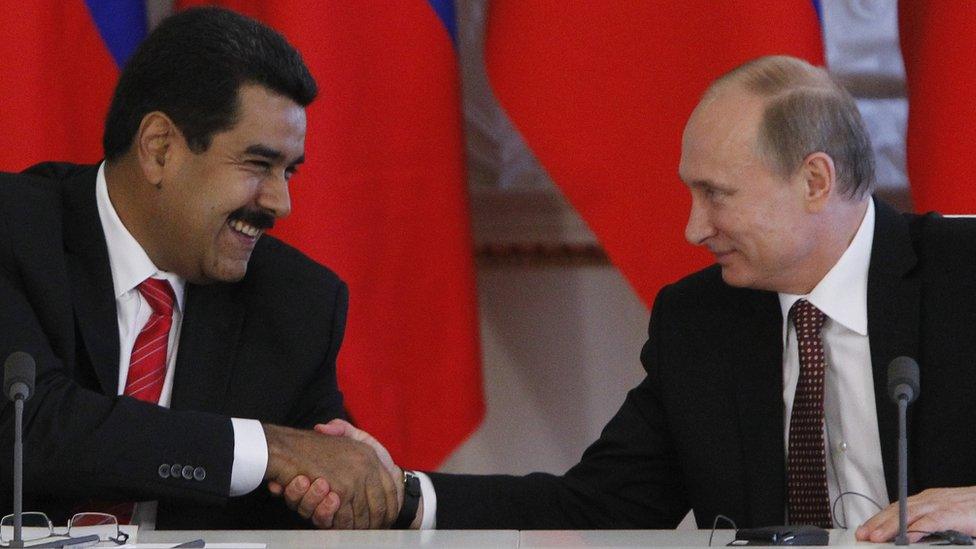
Russia's President Vladimir Putin (R) and his Venezuelan counterpart Nicolas Maduro are close allies
Mr Maduro narrowly won a presidential election in April 2013 after the death of his mentor, President Hugo Chávez. He was elected to a second term in May 2018 in an election seen as flawed by international observers.
Venezuela has experienced economic collapse - inflation was 800,000% last year. Three million people have left.
Mr Guaidó has accused President Maduro of being unfit for office, and won the support of many in the country as well as US and EU leaders.
The Maduro government is becoming increasingly isolated but Moscow has expanded co-operation with Caracas - increasing arms sales and extending credit.
- Published24 January 2019
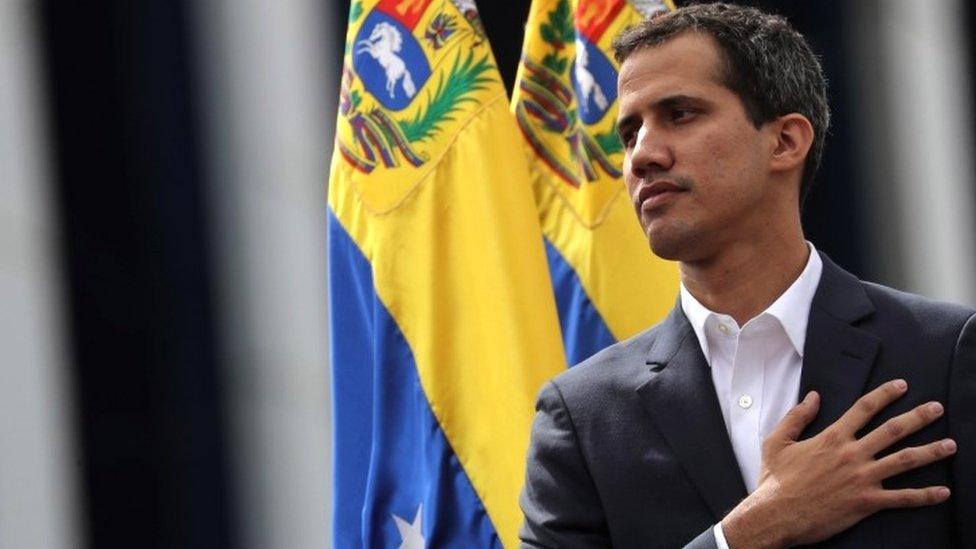
- Published1 February 2019
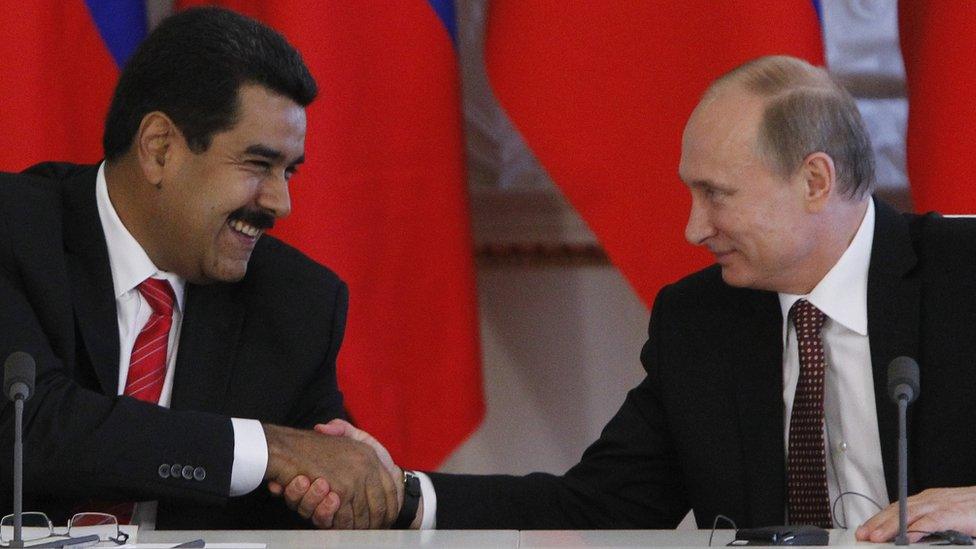
- Published12 August 2021
